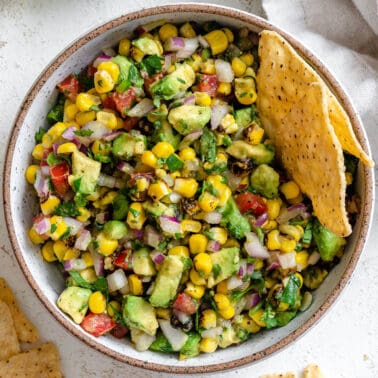As an Amazon Associate I earn from qualifying purchases.
Dr. Matthew Nagra is a Naturopathic Doctor in Vancouver, BC, and is a passionate advocate for plant-based nutrition. He is a public speaker, author, graduate of the T. Colin Campbell Center for Nutrition Studies Plant-Based Nutrition program, and volunteer for the non-profit Nutritionfacts.org.
If there’s one question that every plant-based eater is sick of hearing, it’s “where do you get your protein?” Some people do know that legumes can be a good source of plant-based protein, but there seems to be a common belief that you can’t get enough without animal products. What many don’t seem to understand is that all whole plant foods contain protein! Even bananas have some protein! Of course, I wouldn’t rely on bananas or other fruits as my main source of protein, but I want to make clear that protein is widely available on a plant-based diet and can add up after a full day of eating.
Before highlighting some great plant-based sources of protein, I want to discuss the topic of protein quality. One argument that I often hear is that animal proteins are superior to plant-based proteins. This comes from the idea that plants are deficient in certain amino acids, the building blocks of protein, and that animal-based protein is better digested and absorbed than plant-based proteins.
There are 9 amino acids that are considered essential, meaning that our bodies cannot make them. We must get these from our diet, but the good news is that all whole plant foods contain all the essential amino acids! (1) While it’s true that certain foods like rice or beans may have more or less of certain essential amino acids, I should hope that none of you eat only one food. When we eat a variety of plant-based foods, our bodies actually store and combine all the amino acids for us, so we don’t even have to think about it. (2) There’s no need to focus on combining grains and legumes at each meal because our bodies will save the extra amino acids from breakfast and combine them with the amino acids from lunch and dinner to make “complete proteins.”
Beyond the topic of amino acid content, the protein digestibility argument also falls flat. A 2019 review on plant and animal proteins highlights that the digestibility only differs by a few percent in humans. (1) This means that the digestion and absorption of plant protein is very comparable to animal protein. Furthermore, research that directly compares animal versus plant-based proteins do not find any difference in actual muscle mass or strength benefits over the long-term, and recent studies have demonstrated that switching from animal protein to plant protein may significantly reduce disease and mortality risk! (1,3-9) Not only is plant-based protein a suitable alternative to animal protein, but it comes without many of the risks!
Now that you know about the differences (and similarities) between animal and plant-based proteins, it’s time to focus on the best sources of plant-based protein:
Legumes
One of the most abundant protein sources in the plant kingdom, legumes, package their protein with antioxidants, minerals, and fiber. The fiber is very beneficial for reducing disease risk, specifically colorectal cancer and cardiovascular disease. (10,11) In addition, legumes are the single food group that is most linked to longevity! (12) Legumes include beans, chickpeas, lentils, and split peas.
- Black beans: 1 cup = 15g protein
- Chickpeas: 1 cup = 15g protein
- Red Lentils: 1 cup = 18g protein
Soy
While technically a legume, soy deserves its own category. As discussed in last month’s article, soy may protect against breast cancer, endometrial cancer, prostate cancer, cardiovascular disease, and more,(13-18) while also providing us with important minerals such as calcium and iron! On the topic of protein, soy has a very balanced amino acid profile, providing further reason to consume this wonderful food.
- Tofu: ½ a block = 23g protein
- Soy milk: 2 cups = 12g protein
Whole Grains
Yes, whole grains can be a good source of protein as well! In addition to being a nutritional powerhouse, whole grain consumption has been associated with a lower risk of type 2 diabetes, cardiovascular disease, and multiple cancers. (19)
- Steel cut oats: ½ cup = 10.5g protein
- Quinoa: ½ cup = 4g protein
- Brown rice: ½ cup = 2.5g protein
Nuts/Seeds
Providing an excellent source of healthy fats, particularly from walnuts, hemp seeds, chia seeds, and flax seeds, nuts and seeds have multiple additional health benefits. Perhaps most impressive is their ability to reduce cardiovascular disease, specifically stroke, risk! (20) In addition, hemp seeds provide an excellent balance of amino acids making them a very high-quality choice.
- Almonds: ½ cup = 14.5g protein
- Pistachios: ½ cup = 12.5g protein
- Walnuts: ½ cup = 7.5g protein
- Hemp seeds: ¼ cup = 14.5g protein
There you have it! Not only are plant-based proteins a suitable alternative to animal proteins, but they can provide numerous additional health benefits. Reaping the rewards is as simple as diversifying your diet and making sure to include foods like legumes, whole grains, nuts, and seeds on a daily basis.
References:
1.- Mariotti, F. & Gardner, C.D. Dietary Protein and Amino Acids in Vegetarian Diets – A Review. Nutrients. 2019;11:2661.
2.- Munro, H.N. Free Amino Acid Pools and Their Role in Regulation. Mammalian Protein Metabolism. 1970:299-386.
3.- Cui-yu, L. et al. Amount Rather than Animal vs Plant Protein Intake Is Associated with Skeletal Muscle Mass in Community-Dwelling Middle-Aged and Older Chinese Adults: Results from the Guangzhou Nutrition and Health Study. J Acad Nutr Diet. 2019;119(9):1501-1510.
4.- Babault, N. Pea proteins oral supplementation promotes muscle thickness gains during resistance training: a double-blind, randomized, Placebo-controlled clinical trial vs Whey protein. J Intern Soc Sports Nutr. 2015;12:3.
5.- Joy, J.M. et al. The effects of 8 weeks of whey or rice protein supplementation on body composition and exercise performance. Nutr J. 2013;12:86.
6.- Kalman, D. et al. Effect of protein source and resistance training on body composition and sex hormones. J Intern Sports Nutr. 2007;4:4.
7.- Budhathoki, S. et al. Association of Animal and Plant Protein Intake With All-Cause and Cause-Specific Mortality. JAMA Intern Med. 2019.
8.- Huang, J. et al. Association Between Plant and Animal Protein Intake and Overall and Cause-Specific Mortality. JAMA Intern Med. 2020.
9.- Chen, Z. et al. Dietary protein intake and all-cause and cause-specific mortality: results from the Rotterdam Study and a meta-analysis of prospective cohort studies. Eur J Epidemiol. 2020.
10.- Zhu, B. Dietary legume consumption reduces the risk of colorectal cancer: evidence from a meta-analysis of cohort studies. Sci Rep. 2015;5:8797.
11.- Bazzano, L.A. Legume consumption and risk fo coronary heart disease in men and women: NHANES I Epidemiologic Follow-up Study. Arch Intern Med. 2001;161(21):2573-2578.
12.- Darmadi-Blackberry, I. Legumes: the most important dietary predictor of survival in older people of different ethnicities. Asia Pacific J Clin Nutr. 2004;13(2):217-220.
13.- Wu, AH et al. Epidemiology of soy exposure and breast cancer risk. Br J Cancer. 2008;98(1):9-14.
14.- Kwang-Pil, K et al. Dietary intake and breast cancer among carriers and noncarriers of BRCA mutations in the Korean Hereditary Breast Cancer Study. Am J Clin Nutr. 2013;98:1493-1501.
15.- Zhang, FF et al. Dietary isoflavone intake and all-cause mortality in breast cancer survivors: The Breast Cancer Family Registry. Cancer. 2017:2070-2079.
16.- Ollberding, NJ et al. Legume, soy, tofu, and isoflavone intake and endometrial cancer risk in postmenopausal women in the multiethnic cohort study. J Natl Cancer Inst. 2012;104(1):67-76.
17.- Applegate, C.C. et al. Soy Consumption and the Risk of Prostate Cancer: An Updated Systematic Review and Meta-Analysis. Nutrients. 2017;10:40.
18.- Ramdath, D.D. et al. Beyond the Cholesterol-Lowering Effects of Soy Protein: A Review of the Effects of Dietary Soy and Its Constituents on Risk Factors for Cardiovascular Disease. Nutrients. 2017;9:324.
19.- Reynolds, A. et al. Carbohydrate quality and human health: a series of systematic reviews and meta-analyses. Lancet. 2019;393:434-445.
20.- Guasch-Ferre, M. et al. Frequency of nut consumption and mortality risk in the PREDIMED nutrition intervention. BMC Med. 2013;11:164.











